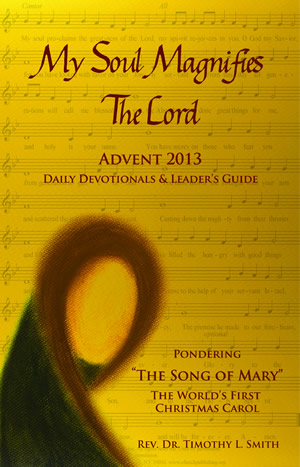
Luke 1:46-47
When I was a hospital chaplain I would sometimes ask patients if they had a favorite hymn. I was often amazed at how pained eyes would light up at the question. That often led into delightful and often emotional conversation about songs like: “How Great Thou Art”, “Great is Thy Faithfulness”, and “Amazing Grace”.
I think that Mary must have had a favorite song that warmed her soul that first Christmas. I think it was the “Song of Hannah”. I think that Mary must have learned the “Song of Hannah” from her mother who was named Anna, the Greek form of Hannah. The “Song of Hannah” was first sung by a godly young woman abused for being barren (I Samuel 1:1-8). Then Hannah prayed and became pregnant, and dedicated her son Samuel to the Lord. While dedicating Samuel she sang to the Lord, praising Him for lifting up the lowly. Samuel grew into one of the great prophets and judges of Israel, and a mentor to Mary’s ancestor, David.
Bible students point out the many similarities in wording between the Song of Hanna (I Samuel 2:1-10), and Mary’s Song. It is apparent that young Mary had pondered Hannah’s Song and modeled her Song after it.
For example, Hannah begins, “My heart exults in the Lord; my strength is exalted in my God”, and Mary begins, “My soul magnifies the Lord, and my spirit rejoices in God my Savior”. Hannah sings, “There is no Holy One like the Lord”, and Mary sings, “Holy is his name”. Hannah praises the Lord that “those who were hungry are fat with spoil”, and Mary praises God that He “has filled the hungry with good things”. Both women conceived miraculously and both women praised God for lifting up the lowly and filling the hungry.
Besides echoing Hannah, Mary’s Song contains allusions to the Psalms, and lines from Job, Genesis, and Micah. She has steeped her mind in Scripture and grounded her faith in God’s Word. She is an example of one who interprets life through the lens of Scripture, and submits herself to God’s way of seeing the world.
The “Song of Mary” is traditionally called the Magnificat, which is the first word of the Latin translation of her song, “Magnificat anima mea Dominum”. “My soul magnifies the Lord.”
To “magnify” means to enlarge, to make bigger in perception. When we magnify an object, we are not making the object itself any bigger, but enlarging our perception of it. As Mary praises God she is magnifying Him while enlarging the world’s perception of Him. Perhaps Mary learned to do this from the psalmist David: “O magnify the Lord with me, and let us exalt his name together” (Psalm 34:3).
For centuries the Magnificat has been chanted and sung in churches, often daily. Next to the Lord’s Prayer there are few passages of Scripture better known than Mary’s Song. Unfortunately we do not have Mary’s original melody, but the words of her song have inspired countless musical arrangements through the years.
We need to learn the words of Mary’s Song! How different Christmas would look to today’s world and the church universal if the words of Mary’s Song were embraced! Do not rush down the road to Bethlehem without making Mary’s Song your own. “My soul magnifies the Lord.”
PONDERING
- Mary was obviously inspired and guided by the “Song of Hannah”. Is there a particular passage of Scripture that inspires and guides you?
- Consider writing your own song during the days of Advent; perhaps pattern it after Mary’s Song, a Psalm, or other passages of Scripture.
- Do you have a favorite musical version of Magnificat? Mine is by the contemporary composer and singer John Michael Talbot, and is titled, “Holy is His Name”. You might enjoy other versions of Magnificat by J. S. Bach, Marc-Antoine Charpentier, Franz Liszt, and Arvo Pärt. See also, Rory Cooney’s adaptation of Mary’s Song set to the Irish tune “Star of the County Down”.



